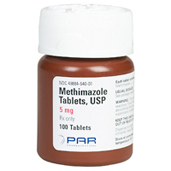Although hyperthyroidism, or overactive thyroid glands, is common in middle aged and elderly cats, it rarely affects younger cats. In fact, only 5 percent of cats with hyperthyroidism are under the age of 10 years, notes the Washington State University College of Veterinary Medicine. The condition is marked by enlarged thyroid glands and an excess of thyroxine thyroid hormone. An adenoma, a type of benign tumor, is often the underlying cause. In rare instances, a malignant tumor known as a thyroid adenocarcinoma is to blame.
"Medications that inhibit the production and release of the thyroxine thyroid hormone are the primary course of treatment for hyperthyroidism in cats."
Signs and Symptoms of Hyperthyroidism
Because thyroid hormones are involved in so many basic biological processes, an excess can cause a wide variety of serious symptoms and health concerns. An increased appetite and weight loss are the most commonly seen effects of hyperthyroidism; an estimated 95 percent or more of affected cats lose weight, according to the ASPCA. Other signs and symptoms of hyperthyroidism in cats include increased thirst and urinary output, diarrhea, vomiting, hyperactivity, aggression and other behavioral changes, excessive shedding, increased heart rate, weakness, periodic labored breathing, an enlarged left heart ventricle, hypertension, and other problems.
Diagnosing Hyperthyroidism in Cats
Diagnosis involves a blood test to confirm elevated thyroid hormone levels. As levels naturally vary, your veterinarian will likely perform several blood tests and record the levels over time. Enlarged thyroid glands can often be felt in the neck during a physical veterinary examination, or they can be identified with a special imaging procedure. Exclusion of other possible causes of observed symptoms is necessary before making a diagnosis, and other blood tests and a urinalysis are important to check the function of other organs.
Treating Feline Hyperthyroidism

Medications that inhibit the production and release of the thyroxine thyroid hormone are the primary course of treatment for hyperthyroidism. Methimazole and its brand-name counterpart Tapazole are the highly effective anti-thyroid drugs used. These medications do not cure the condition, but help manage its symptoms and effects on the body. They must be taken for life.
A potentially permanent solution to hyperthyroidism is surgical removal of the thyroid glands, or a thyroidectomy, in cats determined to be candidates for the procedure. A thyroidectomy requires general anesthesia and carries certain risks, especially to elderly or debilitated pets or those with impaired organ function.
Radioactive iodine therapy is a third option for cats with hyperthyroidism, and it is quickly becoming the favored treatment. Radioactive iodine is injected and rapidly absorbed into the bloodstream, ultimately concentrating in the thyroid glands. There, it kills only the abnormal, over-functioning tissue. This method cures the condition in 95 percent of cases in cats, according to Cornell University's College of Veterinary Medicine, and usually works within one to two weeks. The procedure is generally well-tolerated. The primary drawbacks are that it must be performed in a special facility licensed to handle certain radioactive substances, and it carries a somewhat prohibitive cost.
References
http://www.aspca.org/pet-care/cat-care/hyperthyroidism.aspx
http://www.vetmed.wsu.edu/cliented/hyperthyroidism.aspx
http://www.vet.cornell.edu/fhc/brochures/hyperthyroid.html
The above is provided for information purposes only and should not be used for the diagnosis or treatment of any condition.
This information does not cover all possible variables, conditions, reactions, or risks relating to any topic, medication, or product and should not
be considered complete. Certain products or medications may have risks and you should always consult your local veterinarian concerning the treatment of
your pet. Any trademarks are the property of their respective owners.